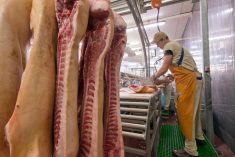Maple Leaf will merge its plant and meat protein divisions and plans to expand in the U.S. market, the company said earlier this month.
“With our refreshed strategic Blueprint announced today, we are sharpening our execution focus… aligning the talents of our team to leverage the strength of our portfolio of leading brands, leadership in sustainability and world-class assets,” said Curtis Frank, president and CEO of Maple Leaf Foods Inc., in a news release.
Maple Leaf released its fourth quarter financial results on Feb. 22. Over 2023, its meat protein group’s sales increased about three per cent to $4.74 billion.
Read Also

Olymel parent company sees increased earnings in 2025
Meat processor Olymel recorded sales of nearly $4.9 billion in 2025 helped by strong pork and chicken markets said parent company Sollio Cooperative Group.
However, in Q4, sales didn’t meet expectations “as a result of global pork market dislocations that have persisted longer and deeper than we anticipated, and a challenging consumer demand environment,” Frank said in the news release.
“Plus we still have a short distance to go to bring home the full benefits from our London Poultry and Bacon Centre of Excellence projects,” he said.
At the end of 2023, the meat protein group had an adjusted EBITDA of $463 million, up 22.3 per cent from 2022.
The plant protein group saw sales of $147 million, down just over 13 per cent from 2022.
“The sales decline was driven by lower volumes in retail and foodservice products, partially offset by pricing action implemented in prior quarters to mitigate inflation,” Maple Leaf said in its 2023 annual report.
The plant division’s end-of-year EBITDA was a loss of $32.9 million compared with a $105.4 million loss in 2022. The company said this improvement came on reduction of startup expenses, higher pricing and “operational improvements.”
In an emailed statement, a spokesperson for Maple Leaf said the plant-based business had performed well in Q4, posting a positive adjusted EBITDA of $0.1 million ($100,000).
Meat processors struggled in 2023, with Olymel dialing back hog production in Alberta and Saskatchewan early in the year, and closing processing plants in Ontario and Quebec.
“Over the past two years it is well documented that Olymel has experienced significant losses in the processing of fresh pork as a result of limited market access globally,” Olymel CEO Yanick Gervais said May 2023.
“Now, coupled with stubbornly high feed costs, resulting in unprecedent losses in the hog sector, we have little choice but to retract and position ourselves for success in the future when conditions improve.”
Manitoba-based Hylife Foods shuttered its Windom, Minnesota plant at the beginning of June, and laid off a handful of mainly administrative workers in Manitoba, citing “current global condition.”
In the plant protein space, Nourish Marketing noted in its 2024 trend report that while consumer curiosity drove the first wave of plant-based meat analogues, most consumers “will not pay a price comparable to meat for a product they view as a disappointing alternative to the real thing” while vegans and vegetarians drive only a small portion of sales.
Nourish predicted a consolidation of products in that space and a turn toward more plant-forward options.
















